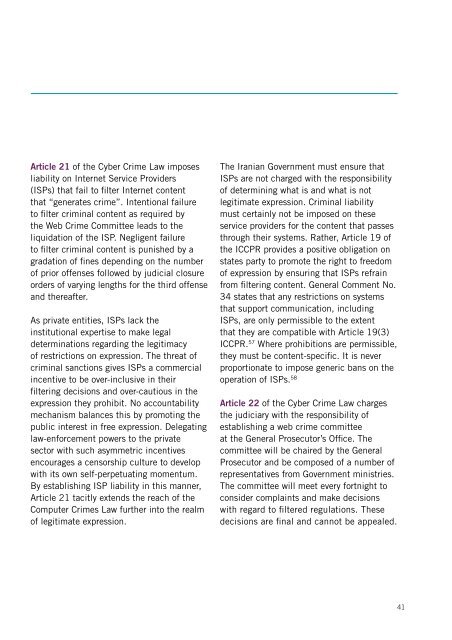Islamic Republic of Iran: Computer Crimes Law
Islamic Republic of Iran: Computer Crimes Law
Islamic Republic of Iran: Computer Crimes Law
Create successful ePaper yourself
Turn your PDF publications into a flip-book with our unique Google optimized e-Paper software.
Sergei Sokolov (Editor-in-chief, Novaya Gazeta) 28<br />
Article 21 <strong>of</strong> the Cyber Crime <strong>Law</strong> imposes<br />
liability on Internet Service Providers<br />
(ISPs) that fail to filter Internet content<br />
that “generates crime”. Intentional failure<br />
to filter criminal content as required by<br />
the Web Crime Committee leads to the<br />
liquidation <strong>of</strong> the ISP. Negligent failure<br />
to filter criminal content is punished by a<br />
gradation <strong>of</strong> fines depending on the number<br />
<strong>of</strong> prior <strong>of</strong>fenses followed by judicial closure<br />
orders <strong>of</strong> varying lengths for the third <strong>of</strong>fense<br />
and thereafter.<br />
As private entities, ISPs lack the<br />
institutional expertise to make legal<br />
determinations regarding the legitimacy<br />
<strong>of</strong> restrictions on expression. The threat <strong>of</strong><br />
criminal sanctions gives ISPs a commercial<br />
incentive to be over-inclusive in their<br />
filtering decisions and over-cautious in the<br />
expression they prohibit. No accountability<br />
mechanism balances this by promoting the<br />
public interest in free expression. Delegating<br />
law-enforcement powers to the private<br />
sector with such asymmetric incentives<br />
encourages a censorship culture to develop<br />
with its own self-perpetuating momentum.<br />
By establishing ISP liability in this manner,<br />
Article 21 tacitly extends the reach <strong>of</strong> the<br />
<strong>Computer</strong> <strong>Crimes</strong> <strong>Law</strong> further into the realm<br />
<strong>of</strong> legitimate expression.<br />
The <strong>Iran</strong>ian Government must ensure that<br />
ISPs are not charged with the responsibility<br />
<strong>of</strong> determining what is and what is not<br />
legitimate expression. Criminal liability<br />
must certainly not be imposed on these<br />
service providers for the content that passes<br />
through their systems. Rather, Article 19 <strong>of</strong><br />
the ICCPR provides a positive obligation on<br />
states party to promote the right to freedom<br />
<strong>of</strong> expression by ensuring that ISPs refrain<br />
from filtering content. General Comment No.<br />
34 states that any restrictions on systems<br />
that support communication, including<br />
ISPs, are only permissible to the extent<br />
that they are compatible with Article 19(3)<br />
ICCPR. 57 Where prohibitions are permissible,<br />
they must be content-specific. It is never<br />
proportionate to impose generic bans on the<br />
operation <strong>of</strong> ISPs. 58<br />
Article 22 <strong>of</strong> the Cyber Crime <strong>Law</strong> charges<br />
the judiciary with the responsibility <strong>of</strong><br />
establishing a web crime committee<br />
at the General Prosecutor’s Office. The<br />
committee will be chaired by the General<br />
Prosecutor and be composed <strong>of</strong> a number <strong>of</strong><br />
representatives from Government ministries.<br />
The committee will meet every fortnight to<br />
consider complaints and make decisions<br />
with regard to filtered regulations. These<br />
decisions are final and cannot be appealed.<br />
41


